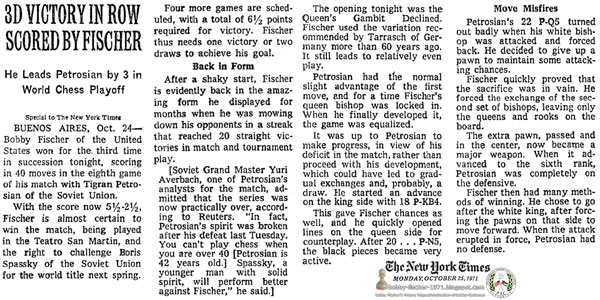New York Times, New York, New York, Monday, October 25, 1971 - Page 36
3D Victory In Row Scored By Fischer — He Leads Petrosian by 3 in World Chess Playoff
Buenos Aires, Oct. 24—Bobby Fischer of the United States on for the third time in succession tonight, scoring in 40 moves in the eighth game of his match with Tigran Petrosian of the Soviet Union.
With the score now 5½-2½, Fischer is almost certain to win the match, being played in the Teatro San Martin, and the right to challenge Boris Spassky of the Soviet Union for the world title next spring.
Four more games are scheduled, with a total of 6½ points required for victory or two draws to achieve his goal.
Back in Form
After a shaky start, Fischer is evidently back in the amazing form he displayed for months when he was mowing down his opponents in a streak that reached 20 straight victories in match and tournament play.
[Soviet Grand Master Yuri Averbach, one of Petrosian's analysts for the match, admitted that the series was now practically over, according to Reuters. “In fact, Petrosian's spirit was broken after his defeat last Tuesday. You can't play chess when you are over 40 [Petrosian is 42 years old.] Spassky, a younger man with solid spirit, will perform better against Fischer,” he said.]
The opening tonight was the Queen's Gambit Declined. Fischer used the variation recommended by Tarrasch of Germany more than 60 years ago. It still leads to relatively even play.
Petrosian had the normal slight advantage of the first move, and for a time Fischer's queen bishop was locked in. When he finally developed it, the game was equalized.
It was up to Petrosian to make progress, in view of his deficit in the match, rather than proceed with his development, which could have led to gradual exchanges and, probably, a draw. He started an advance on the king side with 18. P-KB4.
This gave Fischer chances as well, and he quickly opened lines on the queen side for counterplay. After 20. … P-N5, the black pieces became very active.
Move Misfires
Petrosian's 22. P-Q5 turned out badly when his white bishop was attacked and forced back. He decided to give up a pawn to maintain some attacking chances.
Fischer quickly proved that the sacrifice was in vain. He forced the exchange of the second set of bishops, leaving only the queens and rooks on the board.
The extra pawn, passed and in the center, now became a major weapon. When it advanced to the sixth rank, Petrosian was completely on the defensive.
Fischer then had many methods of winning. He chose to go after white king, after forcing the pawns on that side to move forward. When the attack erupted in force, Petrosian had no defense.
























